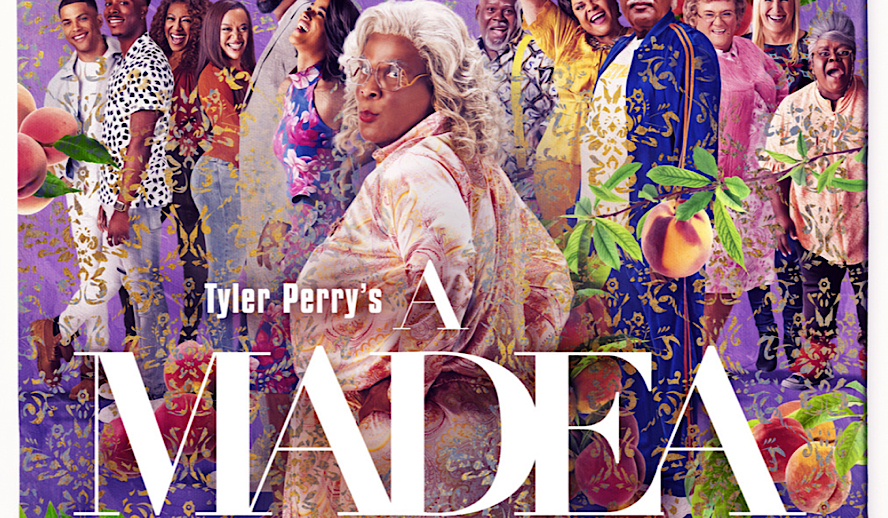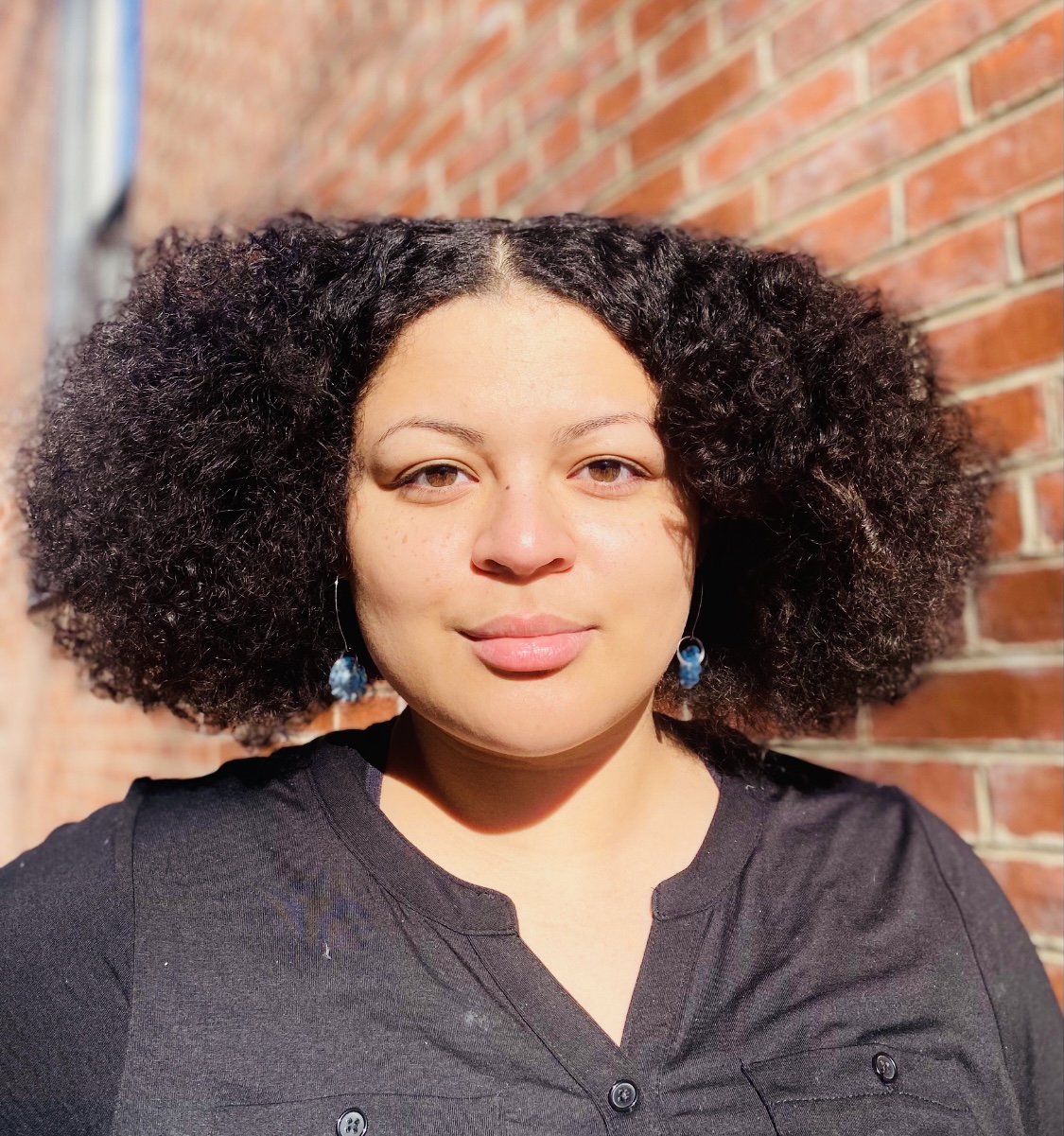Table of Contents

Photo: ‘Tyler Perry’s A Madea Homecoming’
Everyone, this is not a drill! On January 17, 2022, Black Cinema legend and creator of Tyler Perry Film Studios Tyler Perry, released a special announcement to fans everywhere: Madea is coming back to the big screen! Just when you thought she was gone, her return was teased last summer and left us on the edge of our seats. And now, the wise, gun-wielding, Dr. Phil-torturing, and polarizing matriarch of the Brown family is making her Netflix debut on February 25, 2022. So set your clocks and stay on the watch, Madea’s coming back to town!
Now, this excitement might confuse some readers. She’s a controversial character, as evidenced by Academy Award winner Spike Lee – the director and star of classic Black Cinema features like ‘Malcolm X’ and ‘Do the Right Thing’ – calling Madea and co. “Coonery and Buffoonery.”
Related article: OSCAR-NOMINATED – ‘West Side Story’ Full Commentary – Rita Moreno, Steven Spielberg, Rachel Zegler
Related article: OSCAR-NOMINATED – EXCLUSIVE: ‘Dune’ Full Commentary, Reactions, Making Of – Timothee Chalamet, Zendaya, Oscar Isaac
‘Tyler Perry’s A Madea Homecoming’
When asked about his thoughts on Lee’s criticisms, Perry offered some choice words, “Spike can go straight to Hell! You can print that. I am sick of him talking about me, I am sick of him saying, ‘this is a coon, this is a buffoon.’ I am sick of him talking about Black people going to see movies. This is what he said: ‘you vote by what you see,’ as if Black people don’t know what they want to see.”
Spike Lee isn’t the only person to criticize Perry and his characters: Out of his 11 Madea films, five of them have accumulated a whopping 20 Golden Raspberry Awards, and her movies have an average rating of 3/10 stars on IMDB.com.
I can understand why the man who wrote and directed ‘BlacKkKlansman’ would not think too highly of Perry’s work as a filmmaker. The two have drastically different aesthetics, themes, and audiences, and I don’t believe one is superior to the other.
I am an avid fan of Spike Lee and of many other Black filmmakers and playwrights. But I sit here, a queer, 22-year-old Black and Japanese American, coming to Perry and Madea’s defense. And, hopefully, I will present a convincing enough argument to inspire some of you to look at Madea from a different perspective when you watch her newest adventure.
Tyler Perry: The Mastermind Behind it All
Perry comes from a disturbing upbringing. In his adulthood, he has spoken openly about the physical and sexual abuse he suffered as a child, a trauma that has inspired the plots of many of his films. Perry moved from New Orleans to Atlanta hoping to put up his first stageplay, ‘I Know I’ve Been Changed’, a story of two adults using their faith in God to heal from rape and child abuse. The show took over five years to be produced and went on to sell out regularly.
Perry’s life is the story of forgiveness as well. After the abuse he endured from his father, the two patched many wounds and Perry has moved on to help his father retire. The two continue to have a tumultuous relationship, but still “very respectful”.
After the success of ‘I Know I’ve Been Changed’, Perry did quite well in his career, gaining the love of Southern Christian audiences. Suddenly, during the debut of his third stageplay in 1999, ‘I Can Do Bad All by Myself’, he hit a roadblock that could have ruined him. Little did he know that this challenge would be the beginning of his journey to seemingly unstoppable fame.
In ‘I Can Do Bad All by Myself’, a popular actress (who Perry refuses to name) was supposed to play an older, tough-loving, plus-size woman that helps guide the heroine to greener pastures. Unfortunately (actually, fortunately), the actress was a no-show. Perry improvised and tossed on the dress and wig, transforming into the now world-beloved cantankerous grandmother, Madea Simmons. 6 years and 5 plays later, Perry made his first film, which prominently featured Madea. It debuted No. 1 in the box office, grossing over $50 million worldwide from a $5.5 million budget. But why did Madea work so well and gain the attention of this many people?
Related article: #metoo Revolution: Powerful Questions That Need Answers
Related article: FACT-CHECKED Series: Timothee Chalamet and 32 Facts about The Young Superstar
Tyler & Madea
Like many other of his creations, Madea was born out of Perry writing about people he knew. For Madea, he took inspiration from his aunt and mother, something he shared in this interview with NPR:
“[Madea] is the PG version of my mother and my aunt, and I loved having an opportunity to pay homage to them. She’s strong, witty, loving, I mean really, just like my mother used to be before she died. She would beat the hell out of you but make sure the ambulance got there in time to make sure they could set your arm back, you know what I mean? Because the love was there inside all of it.”
Madea harkens back to an old-school way of parenting that many African American families relate to. “That’s why I think [Madea] is so popular,” Perry continued, “because a lot of people miss that type of grandmother…”
The idea of dressing in drag wasn’t foreign to Perry. The bug was originally planted when he saw Eddie Murphy’s female characters in ‘Nutty Professor’, a film franchise where Murphy plays an entire family. The mother, Mama Klump, is known for being family-oriented, smothering her kin with love and affectionate nicknames – This is where Murphy’s famous “Hercules, Hercules!” quote originated from. Funny enough, Madea in a lot of ways is the opposite of this character, but it was her matriarchal position and love of family that helped spark the beginnings of Madea. And, of course, her contagious hilarity.
When Perry brought Madea on stage for the first time, he hadn’t fully formed her. For the beginning of the play, he sat in one spot and spoke low. But as the show continued he began to move, tell jokes, and then received a standing ovation at the end of the performance. Madea made Perry a household name. So, when he brought her to the big screen, the Church vans that went to his stageplays headed to the movie theatres.
When asked if he loves Madea, Perry answered, “What she does for people gives me great joy. What she’s done for me, yes.”
So, from the love of his maternal figures and Eddie Murphy’s comedic genius, Madea began to become a force of her own.
Madea’s Popularity and Meme-ification
Mabel “Madea” Earlene Simmons – aka Premium Simmons, aka Jemima the Hut, aka Wide Load – has starred/made cameos in 3 television shows, 11 plays, and 12 films – soon to be 13. She has also been featured in TV/Youtube programs, such as ‘The Tonight Show Starring Jimmy Fallon’, Vanity Fair, OWN, and has her own B.E.T. commercial with her brother Joe, also played by Perry.
In Perry’s films, he also makes sure to integrate Madea into modern-day TV culture. In ‘Madea’s Big Happy Family’, she makes an appearance on ‘Maury’ to prove that Mr. Brown, an eccentric, devout Christian Deacon who is often Madea’s counterpart, is the father of her daughter, Cora. In typical Maury fashion, the DNA test reveals he is not the baby Daddy, and Madea runs through the studio, calling herself a “no-good hoe”. She also has a famous scene in her prison movie with Dr. Phil, where she is the one patient the Doctor is unable to help.
Limited Time Offer – FREE Subscription to The Hollywood Insider
Madea Simmons has taken on a life of her own, a figure people look to for parodies of pop culture. In the newest Twitter press releases and teasers for ‘Madea Homecoming’, Perry revealed a promotional poster of Madea as Beyoncé on the cover of Bey’s album ‘Homecoming’, referring to her fans as the ‘MOTH-HIVE”, rather than the Beyhive. As for past films, Madea has recreated posters for ‘The King’s Speech’, ‘Godfather’, ‘The Black Swan’, and more. This marketing has become so well-received that fans have begun making their own Madea versions of critically acclaimed film posters. She has her own Instagram account and participates in meme culture. She has 359,000 followers and only follows five people, including Perry and Oprah Winfrey.
Ma to the Damn D.E.A – Who is Madea?
Madea is a sexagenarian (or septuagenarian) African American woman who grew up in a shotgun house in Louisiana. She is a crass, rowdy, former sex worker and exotic dancer, with a criminal record dating back to when she was 9. She has been arrested for, among other crimes, assault, identity theft, insurance fraud, criminal trespassing, and attempted murder. She does not have a high school education and speaks in her own Madea vernacular, replacing “Hello” with “Hellur” and Hallelujah with “Halleluyer”.
But Madea is also honest, with a strong and unwavering sense of self. She knows her values and she knows herself, never apologizing for who she is and never being subservient to anyone. She encourages people to stand up for themselves in any and all situations. A firm believer in an eye for an eye, one of Madea’s most famous forms of justice was the “grit ball”, a self-defense ‘game’ introduced in ‘Madea’s Family Reunion’. When battered wife Lisa comes to Madea for guidance, Madea tells her to splash her husband’s face full of hot grits and then beat him with a skillet. “Throw it, and swat it,” she says, “Throw it and swat it. Venus and Serena. That’s called grit ball.”
These vigilante solutions are likely a result of being brought up in an environment where the cops were unreliable, or, if the cops got involved, the primary caregiver of the home could be arrested. Therefore, Madea created her own rules for exacting justice. She knows the people in the neighborhood and knows prison isn’t the solution for them. In fact, most of the times she has been arrested are due to her trying to right wrongs: In ‘Diary of a Mad Black Woman’, after her granddaughter, Helen, is kicked out of her husband’s house (dragged out by force), Madea breaks into the home and saws all of the furniture in half in vengeance. In her own words, “How’s a man throw a woman out her own house? No man would ever do that to me, he’d put me out half of the house, I’ll go live in the other half!”
Related article: The Hollywood Insider’s CEO Pritan Ambroase: “The Importance of Venice Film Festival as the Protector of Cinema”
Related article: The Masters of Cinema Archives: The Hollywood Insider Pays Tribute to ‘La Vie En Rose’, Exclusive Interview with Director Olivier Dahan
Related article: – Want GUARANTEED SUCCESS? Remove these ten words from your vocabulary| Transform your life INSTANTLY
Madea also gives that old-school tough love that comes with brutal honesty and, if you push her, you can expect a couple of hard slaps to the face. But that tough love is unconditional and forgiving. In ‘Family Reunion’, she spanked her foster daughter, Nikki, after she lied to Madea about going to school. After spanking her with a belt, Nikki revealed she’d been told she would never succeed in life, and she’d begun to believe it. And although Madea couldn’t help her study, she found someone who could help and pointed her in that direction, supporting her through the challenge.
She demands that the people she loves show respect for themselves so that others will show them respect. In ‘Big Happy Family’ when Madea criticizes her cousin Byron for hanging his pants low, he defends the style and calls it ‘swag’, saying that everybody’s doing it. In disgust, she shouts, “Why don’t you lead and let everybody else follow you?” and follows this wisdom with “Pull your damn pants up, you look like a fool!”
And like people taking ownership of their appearance, Madea encourages others to take ownership of their lives: She teaches people not to be victims. In ‘Madea Goes to Jail’, a convict is blaming her parents for her imprisonment, and Madea corrects her complaints: “Honey, you in jail because of what you did. Learn to take some responsibility for yourself…. however good or however bad [your childhood] was, now it’s up to you to make something of it.”
And despite being a larger woman (Perry is 6’6 and wears a fat suit during his portrayal of her), she is proud of her sexuality and of her body. “These stretch marks is a road map to Heaven,” she says, “Hell if you follow this GPS it’s gon’ take you somewhere you ain’t never been befo’.” She won’t let just anyone have a piece of her pie, too. She believes in consent and will defend herself from unwanted advances. She also preaches the importance of healing from sexual trauma by forgiving your abusers, something Perry himself has done.
When it comes to religion, Madea is not a practicing Christian – she often misquotes or repurposes Bible verses to suit her point. On multiple occasions, she refuses to go to Church and has said, “You know God don’t like me.” But she does believe in the practice of prayer. Not as a solution, but as a time for self-reflection. Unlike Mr. Brown, Madea won’t leave things up to God. She recommends prayer as a means of finding out what you need to help yourself. Her lack of Bible-thumping makes her less intimidating to those seeking refuge.
Related article: Curves and Swerves for your Nerves: Are Black Female Bodies Being Celebrated or Fetishized?
Related article: 2022 Oscar Nominations: Notables, Surprises, Snubs, and An Analysis of The Academy Awards
When I was a young girl, Madea always represented to me someone who was a no-nonsense elder with admirable values. And those values juxtaposed with her outlandishness, and, of course, her fashion sense, made her both funny and fierce. Although she criticizes and screams, and sometimes points a gun, she never turns an addict, a friend, or a family member away. She reminds me of the gangsters in films who have an intimidating exterior but still go home to their moms for dinner: She is a protector of her community, and therefore the community protects her.
But despite all of these positive characteristics that schools and parents still preach today, Black luminaries like Spike Lee condemn this character. So, why? It’s not like Lee hasn’t presented us with old-school characters like Da Mayor who bestows wisdom on their community. And it’s not like the vehicle of comedy (or buffoonery) is an unfamiliar way to share morals for the two Gen Xers. But it does seem unfamiliar to my generation.
Generation Z vs. Madea
A couple of days ago I did an informal poll among my peers (students 18 to 22) where I asked them: “What do you think of Tyler Perry’s Madea? Does Madea negatively or positively affect the Black community?”
Each of the people that responded described Madea as a negative representation of Blackness. They called her annoying, abusive, derivative, and a stereotypical angry Black woman. One of my peers who wishes to remain anonymous is a 19-year-old queer POC who shared how Madea is a conflicting figure in their life:
“Part of me enjoys [Madea because she] reminds me of the elder women in my family, especially those from the south which brings a sort of comfort and nostalgia, and I know a lot of people have a similar sense of connection. At the same time, I know those characteristics are very toxic even though they can be realistic for many who grew up with people like that in their life.”
Another student said Madea is “the worst!! Literally emotionally/physically abusive in the name of comedy. Like some of the things she says is funny but I couldn’t even begin to imagine being on the other side of her rants/curse-outs.”
Related article: MUST WATCH – The Hollywood Insider’s CEO Pritan Ambroase’s Love Letter to Black Lives Matter – VIDEO
Subscribe to The Hollywood Insider’s YouTube Channel, by clicking here.
Well, maybe that’s the point. Maybe younger people aren’t meant to enjoy watching her threaten Tammy’s children into submission. Maybe it would be scary to be on the other end of it. But that type of upbringing is the foundation for many of my family members’ lives.
Generation X and Boomers v. Madea
When I asked people of older generations the same questions they described Madea as sage, loving, family-oriented, and familiar. My aunt, a Christian, Southern-bred Emory graduate who recently retired from her position as a Senior Manager at a Cardiology Clinic, shared how she sees the caricature:
“Madea is somebody who’s done a lot of [good and bad] in her lifetime… She grew up in that neighborhood and so she knows the people, she knows the lifestyle, and she has a place where people can come and have fun and get help… she really doesn’t want people to fall into the problems that she had in the past.”
Cedric Hill of To and Fro Productions made the argument that Madea is a person who is critical for Black people’s survival: “Madea is a central character that helped people survive for centuries… Let’s be honest, Black people are still being killed for sport. Madea’s antics are crazy, but Madea slapping you upside your head is Madea saying ‘Don’t talk smart to that cop, or you could get killed’’.
When I asked Hill about his upbringing, he said he was raised by Caribbean parents who would “punch him in the back of the head” if he stepped out of line. Hill credits his maturity as an adult in part to this type of punishment, “Sometimes, you really gotta be slapped out of stupidity,” he said, “A lot of people nowadays think a lot of things aren’t a big deal because there haven’t been any consequences their whole lives… if there’s no pushback, the boundaries just keep getting expanded.”
It’s dangerous being a Black person in America. A POC can get murdered without consequence, and that is a lesson Black parents have had to teach their children. Parents teach their children not to give cops another reason to pull out their guns. Self-defense and understanding the severity of the world Black people live in are things Black children need to learn early on. “You know, I was raised in a different time,” Hill said “The problem is times haven’t really changed that much as people think they have.”
When discussing Madea, it is critical to understand that she comes from this world of violence and hustle. And because the outside world cannot be trusted, the family becomes everything.
My Great Aunt Dr. Webb says that the older she gets, the more she identifies with Madea. “I love to curse, I love to drink, I’m irreverent … that’s how I roll.” But I learned that her and Madea’s biggest similarity wasn’t their fun antics, but the way that they love. Webb said:
Related article: EVOLUTION: Every Henry Cavill Role From 2001 to 2021, All Performances Exceptionally Poignant
“Lemme tell you, somebody jumps up at me, if I have a pistol or a knife in my pocket, or I’ve just got my teeth, I’m gonna go after your ass. I’m not gonna try and negotiate. Even if I die, I’m going to die trying to defend myself or someone I love. [It’s most important to know] who you are and defending what you think is right and defending who you love, and at the end, the least important is yourself. To me, everybody else comes first.”
Defending the tribe against forces of ignorance is a reality that Madea’s target audience can relate to: Black, Christian, working-class Gen X/Boomer Southerners who grew up during Emitt Till and Rodney King. Being Black in America has been a death sentence.
Audience is Everything
It is important to recognize that Madea is not written for people who use 10 dollar words.
“The truth is, Perry doesn’t make movies for me and my intellectual/artistic/academic-type friends,” Valerie Boyd wrote in ATL Magazine, “He ma2kes movies for people like my brothers, Mike and Tim, both blue-collar, working-class guys who are longtime deacons in their churches.”
Whether we like it or not, Black people, just like White people, are divided by classes. Working-class people often go to the Cinema for entertainment, not for complexity. For example, White audiences everywhere enjoy the foul-mouthed absurdity of Adam Sandler films. But critics haven’t always been so favorable. Sandler films have been nominated for 37 Raspberry Awards and have received mostly negative reviews from critics. But audiences love him and have made him one of the richest actors in the world with a net worth of $420 million.
I recognize that comparing Black and White audiences is tricky. As the people in power, White people can afford to act a fool. But just as White people deserve nonsensical entertainment, so do Black people.
There is nothing wrong with the Mikes and the Tims of the world, and we shouldn’t shame them for the films they like. If White Hollywood can produce films for the working class and films for the highbrows, why can’t we?
Related article: OSCAR-NOMINATED – ‘House of Gucci’ Full Commentary & Behind the Scenes – Lady Gaga, Adam Driver, Jared Leto, Al Pacino
Related article: OSCAR-NOMINATED – ‘Belfast’ Full Commentary & BTS – Jamie Dornan, Caitriona Balfe, Judi Dench
Conclusion
I am not going to sit here and say that I don’t understand why Madea is considered a negative image that cheapens Black people. I’m not thick. After centuries of slavery and a country built on the backs of Black people, proper African American representation is way overdue. One could argue that we have so much ignorance to make up for that we shouldn’t waste it with characters like Madea, a brash woman similar to a 1900s mammy.
But in this fight for our seat at the table, we can’t pinpoint any of our failings on Madea. Because Madea isn’t the problem. Perhaps the problem is that centuries of systematic oppression have led to Madea figures being necessary for Black communities. Perhaps the problem is that we still need Madeas today. Perhaps the problem is that some Black creatives want to ignore the parts of our community who feel persecuted by Black intellectualism, so they run to simpler films with predictable formulas.
And perhaps the problem is that people are criticizing a man who gamed the system so well that he became the first Black man to open the largest (and first Black-owned) major film production studio in America, a studio that has helped give back to his community and creates more seats at the table for Black people with every production. Perry and future Black filmmakers owe a lot of their success to Madea, and to the millions of Americans that she has touched. And why can’t that be reason enough to celebrate and say, “Halleluyer”?
‘Tyler Perry’s A Madea’s Homecoming’ comes out February 25, 2022, on Netflix.
By Z Murphy
Click here to read The Hollywood Insider’s CEO Pritan Ambroase’s love letter to Cinema, TV and Media. An excerpt from the love letter: The Hollywood Insider’s CEO/editor-in-chief Pritan Ambroase affirms, “We have the space and time for all your stories, no matter who/what/where you are. Media/Cinema/TV have a responsibility to better the world and The Hollywood Insider will continue to do so. Talent, diversity and authenticity matter in Cinema/TV, media and storytelling. In fact, I reckon that we should announce “talent-diversity-authenticity-storytelling-Cinema-Oscars-Academy-Awards” as synonyms of each other. We show respect to talent and stories regardless of their skin color, race, gender, sexuality, religion, nationality, etc., thus allowing authenticity into this system just by something as simple as accepting and showing respect to the human species’ factual diversity. We become greater just by respecting and appreciating talent in all its shapes, sizes, and forms. Award winners, which includes nominees, must be chosen on the greatness of their talent ALONE.
I am sure I am speaking for a multitude of Cinema lovers all over the world when I speak of the following sentiments that this medium of art has blessed me with. Cinema taught me about our world, at times in English and at times through the beautiful one-inch bar of subtitles. I learned from the stories in the global movies that we are all alike across all borders. Remember that one of the best symbols of many great civilizations and their prosperity has been the art they have left behind. This art can be in the form of paintings, sculptures, architecture, writings, inventions, etc. For our modern society, Cinema happens to be one of them. Cinema is more than just a form of entertainment, it is an integral part of society. I love the world uniting, be it for Cinema, TV. media, art, fashion, sport, etc. Please keep this going full speed.”
More Interesting Stories From The Hollywood Insider
– Want GUARANTEED SUCCESS? Remove these ten words from your vocabulary| Transform your life INSTANTLY
– A Tribute to Martin Scorsese: A Complete Analysis of the Life and Career of the Man Who Lives and Breathes Cinema
– Do you know the hidden messages in ‘Call Me By Your Name’? Find out behind the scenes facts in the full commentary and In-depth analysis of the cinematic masterpiece
– A Tribute To The Academy Awards: All Best Actor/Actress Speeches From The Beginning Of Oscars 1929-2019 | From Rami Malek, Leonardo DiCaprio To Denzel Washington, Halle Berry & Beyond | From Olivia Colman, Meryl Streep To Bette Davis & Beyond
– In the 32nd Year Of His Career, Keanu Reeves’ Face Continues To Reign After Launching Movies Earning Over $4.3 Billion In Total – “John Wick”, “Toy Story 4”, “Matrix”, And Many More
Madea Homecoming, Madea Homecoming, Madea Homecoming, Madea Homecoming, Madea Homecoming, Madea Homecoming, Madea Homecoming, Madea Homecoming, Madea Homecoming, Madea Homecoming, Madea Homecoming, Madea Homecoming, Madea Homecoming, Madea Homecoming, Madea Homecoming, Madea Homecoming, Madea Homecoming, Madea Homecoming, Madea Homecoming, Madea Homecoming, Madea Homecoming, Madea Homecoming, Madea Homecoming, Madea Homecoming, Madea Homecoming, Madea Homecoming, Madea Homecoming, Madea Homecoming, Madea Homecoming, Madea Homecoming, Madea Homecoming, Madea Homecoming, Madea Homecoming, Madea Homecoming, Madea Homecoming, Madea Homecoming, Madea Homecoming, Madea Homecoming, Madea Homecoming, Madea Homecoming, Madea Homecoming, Madea Homecoming, Madea Homecoming, Madea Homecoming

Z Murphy (she/they) has a passion for storytelling. As a queer person of color, Z always aims to challenge their readers to look at art in a new light by putting racial and sexual identities in conversation with pop culture. With this dedication to inspiring respectful and insightful dialogue, Z is thrilled to be a part of the Hollywood Insider cohort, a media network that supports content focused on perceptive exploration rather than gossip.








